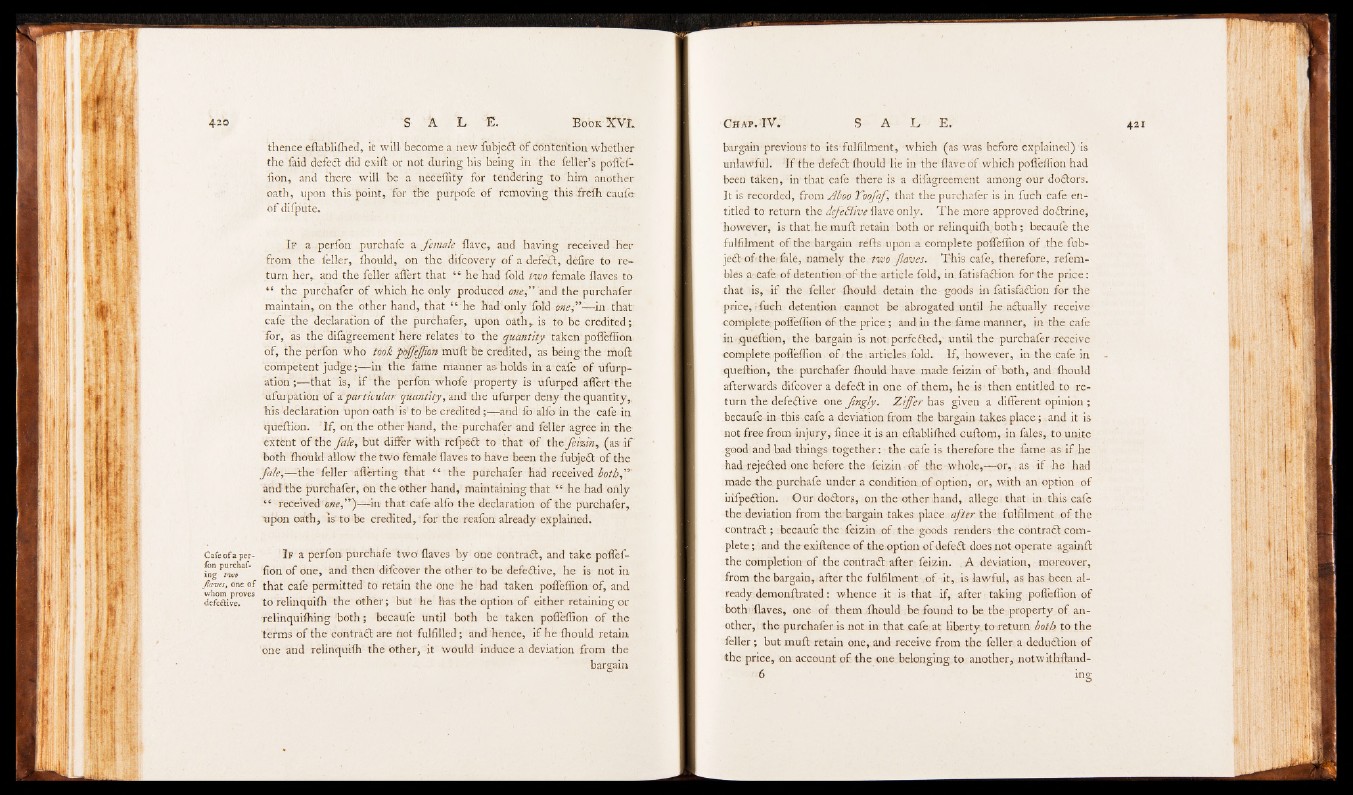
Cafe o f a per-
fon purchaf-
iiig two
Jlaues, one o f
whom proves
defective.
thence eftabli(hed,. it will become a new fubjedl of contention whether
the faid defied! did exift or not during his being in the feller’ s poflef-
fion, and there will be a neeeflity for tendering to him another
oath, upon this-point, for the purpofe of removing this .frelh caufe
of dilpute.
If a perfen purchafe a female have, and having received Her
from the feller, lhould, on the difcovery of a defe'dt, defire to return
her, and the feller aflert that “ he had fold two female Haves to
“ the purchafer of which he only produced owe,’’ ’and the purchafer
maintain, on the other hand, that “ he had1 only fold one.j■“ •^in. that'
cafe the declaration of the purchafer, upon oath,, is to be credited;
for, as the difagreement here relates to the qutmtity taken pofleflion-
of, the perfon who took poffejjion muft be credited, 'as being the mod
competent judge;— in the fame manner as-holds in a cafe of ufurp-
ation;— that ‘is, if the perfon whofe property is ufurped aflert the
uforpatiOn of a particular Quantity, and the ufurper deny the quantity,,
his'declaration upon oath is’ to be credited;— and fo alfo in the cafe in
quedion. If, on the other hand, the purchafer and feller agree in the
extent of the fate, but differ with refpedt to that of the feizin, (as-if
both (hould allow the two female (laves to have been the fubjedl of the
fale,-—the feller aflerting that “ the purchafer had received both,”
and the purchafer, on the other hand, maintaining that “ he had only
“ received ane,,r')— in that-cafe alfo the declaration of the purchafer,
upon oath, is to be credited, for the reaibn already explained..
If a perfon. purchafe two! (laves by one contradl, and take poflef-
(ion of one, and then difcover the other to be defedtive, he is not in
that cafe permitted to retain the one he had taken pofleflion of, and
to relinquifh the other; but he has the option of either retaining or
relinquifhing both; becaufe until both be taken pofleflion of the
terms of the contrail are not fulfilled; and hence, if he (hould retain
one and relinquifh the other, it would induce a deviation from the
bargain
bargain previous to its fulfilment, which (as was before explained) is
unlawful. I f the defedb (hould lie in the (lave of which pofleflion had
been taken, in' that cafe there is a difagreement among our dodtors.
It is recorded, from jiboo Toofef, that the purchafer is in fueh cafe entitled
to return the defeblive (lave only. The more approved'dodlrine,
however, is that he m.uft retain both or relinquifh both; becaufe the
fulfilment of the'bargain reds upon a. complete pofleflion of the fub-
jedl-of the-fale, namely the. two JJaves. This cafe, therefore, refem-
bles -a cafe of detention of the article fold, in. fatisfadlion for the price:
that is, if the feller (hould detain the goods in fatisfadlion for the
price, 'fueh detention cannot be abrogated until he adlually receive
complete: pofleflion Of the price; and in the fame manner, in the cafe
in queflion, the bargain is not. perfedled,- until the purchafer receive
complete pofleflion of the articles, fold. If, however, in the cafe in
queftion, the purchafer (hould have made feizin of both, and (hould
afterwards difcover a defedtin one of. them, he: is then entitled to return
the defedlive one fn g ly. Ziffer has given a different opinion ;
becaufe in this cafe a deviation from the bargain takes place; and it is
not free from -injury, fince it is an eftablifhed cufiom, in fales, to unite
good and bad things together: the cafe is therefore the fame as if he
had rejedted one before the feizin of the -whole,— or,. as i f he had
made the. purchafe under a condition of option, or, with an option of
irifpedtion. Our dodbors, on the other hand, allege-that in-this cafe
the deviation from the bargain takes, place after the fulfilment of the
contradl; becaufe the feizin of the goods renders the contract complete;
and the exiftence of the option of defedt does not operate againfl:
the completion of the contradl after feizin. A deviation, moreover,
from the bargain, after the fulfilment of it, is lawful, as has been already
demonftrated: whence it is that if, after 'taking pofleflion of
both (laves, one of them fhould be found to be the property of another,
the purchafer is not in that cafe: at liberty, to return both to the
feller; but mud retain one, and receive from the feller a dedudtion of
the price, on account of the one belonging to another, notwithftand